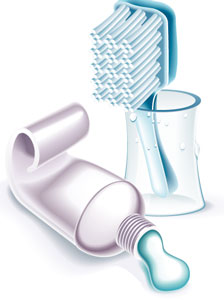 When you visit the dentist, they usually ask you a number of questions about your general health history and the medications you take. It might be puzzling because we often think of our oral health as something separate from our general health. But, as numerous studies and medical research has shown, the two are not separate. Problems with your dental health are often an indicator of a problem somewhere else in the body.
When you visit the dentist, they usually ask you a number of questions about your general health history and the medications you take. It might be puzzling because we often think of our oral health as something separate from our general health. But, as numerous studies and medical research has shown, the two are not separate. Problems with your dental health are often an indicator of a problem somewhere else in the body.
How does the mouth affect the rest of the body? The mouth is full of mostly harmless bacteria. This is completely normal. The body’s natural defenses, along with good oral hygiene such as regular brushing and flossing keep that bacteria at bay. However, sometimes harmful bacteria can grow and multiply, causing problems like tooth decay, gingivitis, and periodontitis. And some dental procedures can reduce the flow of saliva, which helps wash out a lot of the bacteria and acids you consume when you eat. When these things happen, they disrupt the normal balance of bacteria in your mouth and breach your mouth’s protective barriers, making it easier for bacteria to enter the bloodstream, which in turn causes other illnesses.
The American Dental Association explains that “the bacteria and inflammation linked to periodontitis play a role in some systemic diseases or conditions.” Inflammation of the soft tissues of the mouth is a defining characteristic of gum disease, and that inflammation may increase or contribute to inflammation in other parts of the body too. And inflammation is also a hallmark of diseases like endocarditis (an inflammation of the heart’s inner lining), cardiovascular disease, and rheumatoid arthritis. In fact, scientists have also found links between periodontitis and diabetes, dementia, auto immune disorders like Srojen’s syndrome, premature birth, and low birth weight. Also, some diseases, like diabetes, blood cell disorders, HIV, and AIDS, which lower the body’s immune system and resistance to infection, increase the likelihood of gum disease. This is yet another reason for you to brush and floss your teeth regularly and keep your mouth nice and healthy.
 Scientists have also discovered that problems with your oral health can be indictors of a larger problem within the body. If the teeth suddenly begin to crack or disintegrate, or they become almost clear, then you may be suffering from gastroesophageal reflux disease (GERD). These symptoms can also be an indicator of bulimia because the stomach acid produced by frequent vomiting begins to wear away tooth enamel. In older adults, tooth loss is often the first sign of osteoporosis.
Scientists have also discovered that problems with your oral health can be indictors of a larger problem within the body. If the teeth suddenly begin to crack or disintegrate, or they become almost clear, then you may be suffering from gastroesophageal reflux disease (GERD). These symptoms can also be an indicator of bulimia because the stomach acid produced by frequent vomiting begins to wear away tooth enamel. In older adults, tooth loss is often the first sign of osteoporosis.
Always keep an eye out for the signs of oral diseases:
• Red or swollen gums that bleed easily
• Chronically bad breath
• Loose teeth
• A change in the way your teeth fit together when you bite
• A change in the way your dentures fit
If you notice any of the following symptoms, please contact your dentist quickly.
To sum it all up, good oral health is not just good for your mouth. Living a healthy life, being active and eating right, and maintaining good dental hygiene is the best way to keep your entire body, mouth and all, in perfect health.
– Dr. Mark Marchbanks has been a dentist in Arlington Texas since 1983. He enjoys caring for patients young and old. If it’s been more than 6 months since your last teeth cleaning, give us a call today to schedule your check-up.
